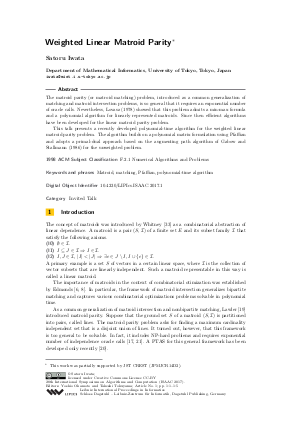Weighted Linear Matroid Parity
Author Satoru Iwata
-
Part of:
Volume:
28th International Symposium on Algorithms and Computation (ISAAC 2017)
Part of: Series: Leibniz International Proceedings in Informatics (LIPIcs)
Part of: Conference: International Symposium on Algorithms and Computation (ISAAC) - License:
 Creative Commons Attribution 3.0 Unported license
Creative Commons Attribution 3.0 Unported license
- Publication Date: 2017-12-07
File

PDF
LIPIcs.ISAAC.2017.1.pdf
- Filesize: 364 kB
- 5 pages
Document Identifiers
Subject Classification
Keywords
- Matroid
- matching
- Pfaffian
- polynomial-time algorithm
Metrics
- Access Statistics
-
Total Accesses (updated on a weekly basis)
0PDF Downloads0Metadata Views
Abstract
The matroid parity (or matroid matching) problem, introduced as a common generalization of matching and matroid intersection problems, is so general that it requires an exponential number of oracle calls. Nevertheless, Lovasz (1978) showed that this problem admits a min-max formula and a polynomial algorithm for linearly represented matroids. Since then efficient algorithms have been developed for the linear matroid parity problem. This talk presents a recently developed polynomial-time algorithm for the weighted linear matroid parity problem. The algorithm builds on a polynomial matrix formulation using Pfaffian and adopts a primal-dual approach based on the augmenting path algorithm of Gabow and Stallmann (1986) for the unweighted problem.
Cite As Get BibTex
Satoru Iwata. Weighted Linear Matroid Parity. In 28th International Symposium on Algorithms and Computation (ISAAC 2017). Leibniz International Proceedings in Informatics (LIPIcs), Volume 92, pp. 1:1-1:5, Schloss Dagstuhl – Leibniz-Zentrum für Informatik (2017)
https://doi.org/10.4230/LIPIcs.ISAAC.2017.1
BibTex
@InProceedings{iwata:LIPIcs.ISAAC.2017.1,
author = {Iwata, Satoru},
title = {{Weighted Linear Matroid Parity}},
booktitle = {28th International Symposium on Algorithms and Computation (ISAAC 2017)},
pages = {1:1--1:5},
series = {Leibniz International Proceedings in Informatics (LIPIcs)},
ISBN = {978-3-95977-054-5},
ISSN = {1868-8969},
year = {2017},
volume = {92},
editor = {Okamoto, Yoshio and Tokuyama, Takeshi},
publisher = {Schloss Dagstuhl -- Leibniz-Zentrum f{\"u}r Informatik},
address = {Dagstuhl, Germany},
URL = {https://drops.dagstuhl.de/entities/document/10.4230/LIPIcs.ISAAC.2017.1},
URN = {urn:nbn:de:0030-drops-82738},
doi = {10.4230/LIPIcs.ISAAC.2017.1},
annote = {Keywords: Matroid, matching, Pfaffian, polynomial-time algorithm}
}
